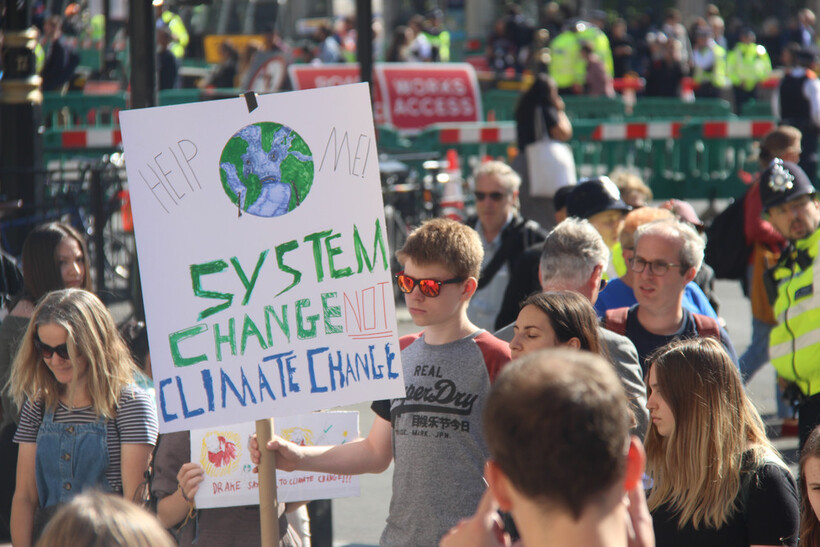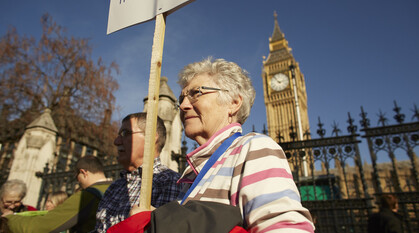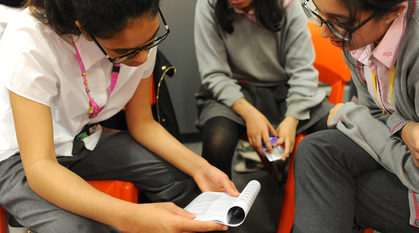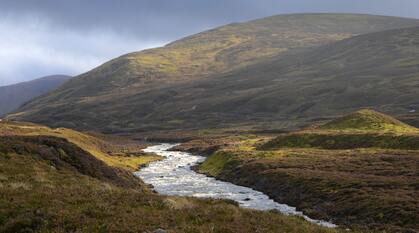Why protest shouldn’t be prevented
Oliver Robertson looks at current government proposals to limit protest rights in Britain.

A key part of Quaker faith is putting that faith into action, trying to change the world using nonviolent methods. For a religion that believes all people have value as children of God, using violence to force change is off the agenda.
Protest has always been one of the methods we have used to do this. From the 17th century to the present day, there have been Quakers impelled by their faith to put their comfort, their liberty, and sometimes their lives on the line to stand up for what they believe in.
Protesting – on marches, demonstrations, or by taking nonviolent direct action – is a way to raise awareness of an issue, register dissent, and to physically prevent injustices from happening in those situations where other options have failed. It is an important part of a democratic society, allowing peaceful ways of expressing legitimate and profoundly held views.
Limiting protest rights
This is why government proposals to limit protest rights in Britain, contained in the Police, Crime, Sentencing and Courts Bill, are so worrying. The intention is to restrict "'highly disruptive protests causing serious disruption to the public". What counts as 'serious disruption'? We'll find out later – the Bill allows the Home Secretary to define this once the legislation is passed.
It's disturbing that disruption is even a reason for preventing protest. Harming others is wrong, but disruption isn't harm. Being inconvenienced is not a human rights violation.
The idea that preventing others going about their business should be a reason to prevent peaceful protest is a way of neutering dissent. If a protest is not causing anyone problems, then it can essentially be ignored. Not giving people a permitted space to express strongly held views and values raises the chances that they will express them in more extreme ways.
Moreover, the planned changes are unlikely to have much effect on some of the most committed protests. A key aspect of nonviolent direct action is taking responsibility for one's actions. Demonstrators and activists frequently wait to be arrested once they have carried out their protest, and then justify themselves in court.
The proposed bill will “widen the range of conditions that the police can impose on static protests, to match existing police powers to impose conditions on marches". If people are concerned enough about an issue to risk their liberty, then being arrested as part of a static protest rather than a moving one may not be a great deterrent. Although it's of course worth remembering that not everyone with strong convictions has the privilege of being able to take such consequences.
Reflecting the reality of protest
As with many groups, there are stereotypes of protestors. But as with all stereotypes, these don't reflect the reality.
The 'fracking nanas' at the Preston New Road drilling protests. John Lynes, over 90 years old and arrested a score of times. The 700 Quakers of many backgrounds and ages coming together to witness against the DSEI arms fair. Reading these personal accounts helps to humanise the protestors and to break down preconceptions about them.
Many are ordinary people propelled by injustice to do extraordinary things. It may well be helpful for lawmakers to be able to see this reality before they vote on these measures.
As Meeting for Sufferings, the standing representative body of Quakers in Britain, noted a decade ago, there are three ways of influencing the state: reforming what exists, creating alternatives, and focusing dissent where opposition is needed.
Opportunities are needed for all three, because there are different things that need to change, grow and stop if we are to make the sustainable and peaceful world that Quakers strive for.
Ways to take action
- Support a charter guaranteeing the right to protest
- Contact your MP (see our new resource (PDF) for guidance on this)
- Share your protest stories with us on Twitter or Facebook.


